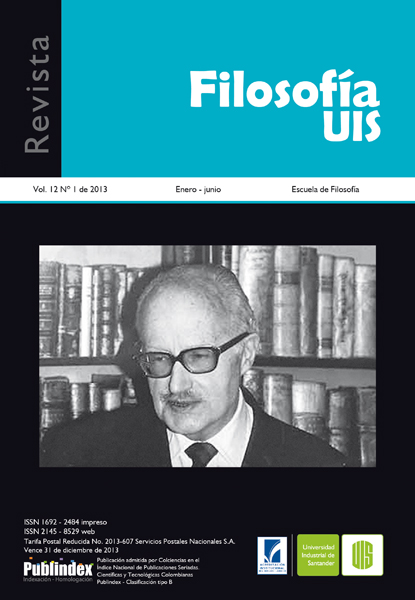Foundations of justice in negative way by Luis Villoro
Published 2013-09-13
Keywords
- teleological,
- deontological,
- justice,
- Rawls,
- Aristotle
How to Cite
Copyright (c) 2013 Edward Javier Ordóñez

This work is licensed under a Creative Commons Attribution 4.0 International License.
Abstract
Luis Villoro’s late work puts the accent in the justice and the multiculturalism, that is to say, in the practical philosophy. The first one is before the second one; without justice one cannot treat the dialog between cultures. So, this article exposes the Latin-American worry for the justice. Specifically, the foundations that allow Villoro’s contribution the theory of the justice. Contribution that it checks the traditional models of justice in focus to the emergency of the beginning that allow it. In effect, the originality of the negative route of the justice takes root in making formal the social materiality of this side of the continent.
Downloads
References
- Arendt, H. (1997). ¿Qué es la política? Barcelona: Paidós.
- Aristóteles (2007). Ética nicomáquea / Política. México: Porrúa.
- Belli, G. (1995). El ojo de la mujer. Madrid: Visor.
- Benhabid, S. (1990). Teoría Feminista y Teoría Crítica. Valencia: Generalizar.
- De Marinis, P. (2005). “16 comentarios sobre la(s) sociología(s) y la(s) comunidad(es)”. Papeles del CEIC. (15). Centro de Estudios sobre la Identidad Colectiva: Universidad del País Vasco.
- Dworkin, R. (1997). Los derechos en serio. Barcelona: Ariel.
- Fornet- Betancourt, R. (2001). Transformación intercultural de la filosofía. Ejercicios teóricos y prácticos de filosofía intercultural desde Latinoamérica en el contexto de la globalización. Bilbao: Desclée de Brouwer.
- Grueso, D. (2008). La filosofía y la política en el pluralismo. La metafilosofía del último Rawls. Bogotá: Siglo del Hombre Editores-Universidad del Valle.
- Honneth, A. (1997). La lucha por el reconocimiento. Barcelona: Crítica.
- Kohlberg, L. (1992). Psicología del desarrollo moral. Bilbao: Desclee de Brouwer.
- MacIntyre, A. (2001). Tras la virtud. Barcelona: Crítica.
- McPherson, C. B. (2005). Teoría política del individualismo posesivo. De Hobbes a Locke. Madrid: Trotta.
- Quepons, I. et al. (2004). Entrevista a Luis Villoro. Imágenes de la Filosofía Latinoamericana. DVD y cuaderno. Veracruz: Producciones Macaco.
- Ramírez, M. (2010). La razón del otro. Estudios sobre el pensamiento de Luis Villoro. México: Universidad Nacional Autónoma de México-Instituto de Investigaciones Filosóficas.
- Sandel, M. (2000). Liberalismo y los límites de la justicia. Barcelona: Gedisa.
- Taylor, C. (2006). Las fuentes del yo: la construcción de la identidad moderna. Barcelona: Paidós Ibérica.
- Taylor, C. (2010). El multiculturalismo. México: Fondo de Cultura Económica.
- Thiebaut, C. (2012). Contra la crueldad y la humillación: los liberalismos “anómalos” de Shklar y Margalit. material inédito.
- Velasco, J. Nudler, O. (ed.) (2010). “El giro globalista de la filosofía de la justicia”. Filosofía de la filosofía. Volumen 31. Enciclopedia Iberoamericana de la Filosofía. Madrid: Trotta / Consejo Superior Investigaciones Científicas.
- Villoro, L. (2005). Los linderos de la ética. México: Siglo XXI.
- Villoro, L. (2007). Los retos de la sociedad por venir. México: Fondo de Cultura
- Económica.
